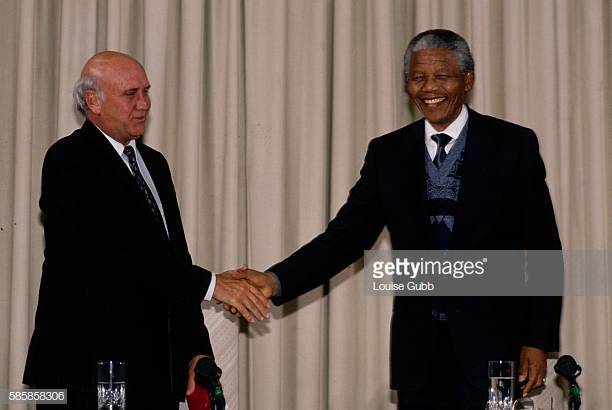NEW COLUMN IS “What Americans Can Learn From F. W. de Klerk’s Great Betrayal Of South Africa.” It’s on American Greatness NOW. The column also appeared on WND.COM and The Unz Review.
Excerpt:
In what should serve as a lesson for Americans today, recall that 30 years ago, on February 2, 1990, F. W. de Klerk, South Africa’s last white president, turned the screws on his constituents, betraying the confidence we had placed in him.
I say “we,” because, prior to becoming president in 1989, Mr. de Klerk was my representative, in the greater Vereeniging region of Southern Transvaal, where I resided. (Our family subsequently moved to Cape Town.)
A constellation of circumstances had aligned to catapult de Klerk to a position of great power. A severe stroke forced the “The Crocodile,” President P. W. Botha, from power in 1989. Nothing in the background of his successor, President, F. W. de Klerk, indicated the revolutionary policies he would pursue.
To a 1992 referendum asking white voters if they favored de Klerk’s proposed reforms, we returned a resounding “yes.” Sixty-eight percent of respondents said “yes” to the proposed reforms of a man who sold his constituents out for a chance to frolic on the world stage with Nelson Mandela.
For it was in surrendering South Africa to the ANC that de Klerk shared the Nobel Peace Prize with Mandela.
Why was de Klerk trusted to negotiate on behalf of a vulnerable racial minority? For good reason: De Klerk had made his views abundantly clear to constituents. “Negotiations would only be about power-sharing,” he promised. At the time, referendum respondents generally trusted de Klerk, who had specifically condemned crude majority rule. Such elections, in Africa, have traditionally amounted to one man, one vote, one time. Typically, elections across Africa have followed a familiar pattern: Radical black nationalist movements take power everywhere, then elections cease. Or, if they take place, they’re rigged.
Among much else, de Klerk’s loyal constituents agreed to his scrapping of the ban on the Communist-sympathizing ANC. Freeing Nelson Mandela from incarceration was also viewed as long overdue as was acceding to Namibia’s independence, and junking nuclear weapons. Botha, before de Klerk, had, by and large, already dismantled the most egregious aspects of apartheid.
What de Klerk’s constituents were not prepared for was to be legislated into a permanent position of political subordination. President de Klerk, the man entrusted to stand up for crucial structural liberties, went along with the great centralizers. He caved to ANC demands, forgoing all checks and balances for South Africa’s Boer, British and Zulu minorities.
By the time the average “yes” voter discerned the fact that de Klerk had no intention of maintaining this opposition when push came to shove, it was too late.
… READ THE REST. “What Americans Can Learn From F. W. de Klerk’s Great Betrayal Of South Africa” is on American Greatness NOW. The column also appeared on WND.COM and The Unz Review.
* Image is of President F.W. de Klerk and Nelson Mandela (Photo by © Louise Gubb/CORBIS SABA/Corbis via Getty Images)
UPDATE (2/10): Nevertheless, we are honored to have a response from Jeffrey Sachs. It generated quite the thread.
My book is not “an attack on the end of apartheid,” @JeffDSachs. That’s a distortion. A principled critique of dominant-party rule in South Africa doesn’t amount to an approval of apartheid, of which the book offers a detailed critique, too.
My book is not "an attack on the end of apartheid," @JeffDSachs. That's a distortion. A principled critique of dominant-party rule in South Africa doesn't amount to an approval of #apartheid, of which the book offers a detailed critique, too. @JuliePonzi https://t.co/INvpCFIU0z
— ILANA Mercer (@IlanaMercer) February 11, 2020
She even came out for an Afrikaner ethnostate. Unapologetic white supremacy.
— Moloch’s bartender (@GerardHarbison) February 10, 2020
Heck, I came out FOR Quebec’s secession (2000), @GerardHarbison & @JeffreyASachs . That’s the libertarian position. Political divorce is completely kosher, so long as individual rights are preserved.
Heck, I came out FOR Quebec's secession (2000), @GerardHarbison & @JeffreyASachs That's the libertarian position. Political divorce is completely kosher, so long as individual rights are preserved. @JuliePonzi https://t.co/Zh9LN162UF pic.twitter.com/UBojmIZx2V
— ILANA Mercer (@IlanaMercer) February 11, 2020
My book's not 'an attack on the end of apartheid,' That's a distortion. A principled critique of dominant-party rule in South Africa doesn't amount to an approval of #apartheid, of which the book offers a detailed critique. (You'll disapprove, too, but Peter Bauer is featured…)
— ILANA Mercer (@IlanaMercer) February 11, 2020
Quote: "As Iraqis learned …ink-stained fingers don’t inoculate against blood stains, or, rather, rivers of blood." The phrase is used to refer to the carnage America wrought in … Iraq. Why distort? On that subject, @JeffDSachs and myself are probably on the same page. https://t.co/dGadprqpob
— ILANA Mercer (@IlanaMercer) February 11, 2020
"As the democratic South Africa amply demonstrates, political rights and a paper constitution don’t secure the natural rights to life, liberty, property, and the pursuit of happiness." @IlanaMercer
— Fiery James (@AngryJ9) February 11, 2020
As "Into The Cannibal's Pot" recounts, the British, not the #Boers, destroyed the #Zulu kingdom, cruelly exiling the great king, #Cetshwayo, breaking a proud man, because he wouldn't behave the western way. Cruelty thy name is Albion. @JeffDSachs @JuliePonzi https://t.co/cqRa9amWtN
— ILANA Mercer (@IlanaMercer) February 11, 2020



